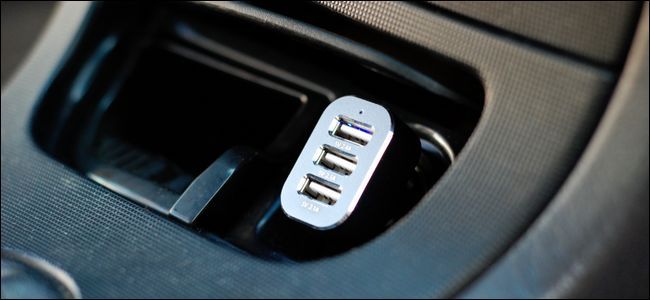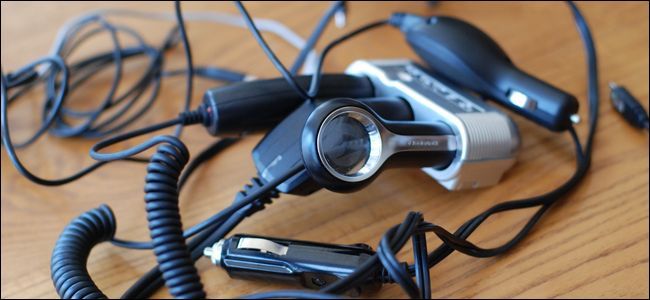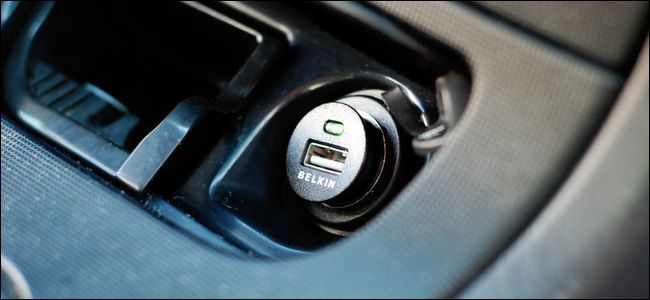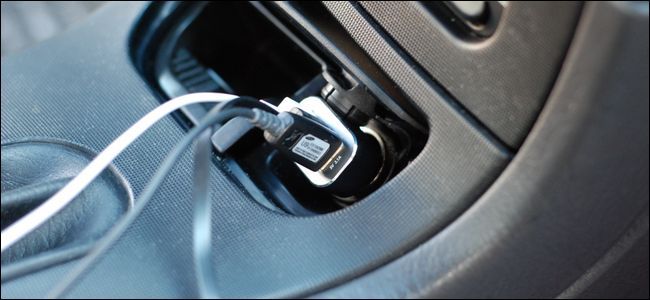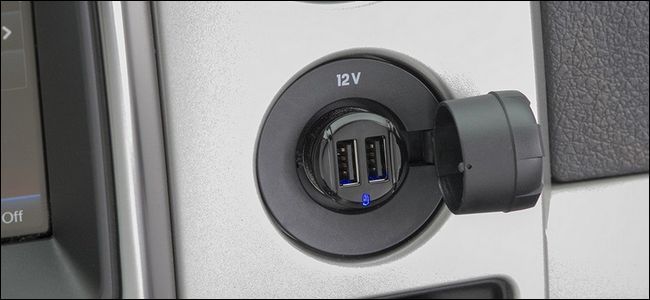Quick Links
It's a tale as old as mobile technology time: buy a new phone or gadget, buy a new 12v car charger for it, repeat again next year. We're here to give you some simple advice. Stop it. The days of device specific car chargers are over. Read on as we outline why you should switch and what products we recommend.
Device Specific Chargers Are an Expensive Waste
If you've been around the mobile gadget block a time or two you know the drill. Anything that gets any regular use in your car needs a charger. Phones, tablets, your kid's Nintendo DS, the portable battery you're trying to top off before you get to the airport, and so on.
The slow push over the last few years to move more and more products to the Micro USB standard has helped cut down on the number of chargers you need to keep on hand (which is wonderful) but it's still very easy to have a mix of devices in your car that need everything from the old Apple 30-pin cable to the new Lightning cable along with some Micro USB and even some old devices with Mini USB like many Bluetooth handsfree devices and GPS units.
Not only is such an arrangement a big cluttery mess as it necessitates keeping multiple bulky chargers on hand that each have their own 12v transformer that needs its own plug (which in turn often requires you to use an adapter for your adapter just to get the right number of 12v charging ports) but it's a waste of money as it requires you purchase more adapters for different standards as they arise. Further, for those that care about such matters, it generates extra waste as all these adapters are eventually discarded.
What's the solution? Stop buying the bulky and inefficient dedicated chargers and start buying universal USB chargers that offer you both the flexibility to use any device with a USB charging cable and the power to charge multiple devices simultaneously.
Before you rush out to buy a universal USB car charger, let's take a hard look at the features you want (and the tech specs you might not realize you need to check) then offer some recommendations for rock solid products that'll be easy on your pocket book and useful in your vehicle.
What to Look for in a Universal USB Car Charger
There are hundreds, nay thousands, of USB car chargers on the market. You'll find them in spades on eBay, in troves on Amazon, and to a lesser degree they're even cropping up in big box stores (with the expected big box price hike). How do you make any sense of it? You look carefully at the specs and reviews. Devices that are underpowered (or don't perform as advertised) are a waste of your money.
Demand High Amps
The humble little cigarette lighter receptacle in your car is more than capable of putting out enough juice to charge many many portable electronic devices. The average American car, for example, has a 12 volt 10 amp receptacle. It's an outright waste of those precious little receptacles to just plug one device into them as they can happily support a plethora of USB-based devices without any undo strain on your car's electrical system or risk of blowing a fuse.
In light of that and of the high-power demands of beefy modern smartphones and tablets there is no reason at all to buy a wimpy USB car charger. At the minimum you should always purchase a device that can provide at least 2.1 amps per USB port on the device. Simply divide the listed amps on the device by the number of ports and skip over any device that can't meet or beat 2.1 amps.
A two port device with a 2.4 amp rating? No deal. A skimpy 1.2 amps per port might have cut it a few years ago, but good luck keeping your iPhone topped off and running the GPS with that kind of weak output. Worse yet, many new devices won't even charge properly (or at all) without 2 amps or more pouring in.
Demand Multiple Ports
There is absolutely no reason to buy a single-port USB car charger. None. While they exist (and we have a few from yesteryear rattling around in glove boxes and junk bins) there is simply no reason at all to buy one with the number of quality USB car chargers on the market today.
Power ports are precious in cars. Older cars only have one and even newer device-centric cars often only have two in reach of the driver and front-seat passenger. You can't afford to waste an entire powerful 12v/10A power port on one device.
Even if you only have one device you need power for it makes zero sense to not have a second port on hand for future devices (or a friend riding shotgun with a smartphone at five percent battery). Our old Belkin charger, seen in the photo above, might have cut it back in the days of the iPad 1 (we actually bought the aforementioned charger in a kit that came with an Apple 30-pin connector cable) but it's impossible to justify a one-port 2A device these days.
The smallest form-factor USB car chargers on the market (so small they're tinier than the cigarette lighters they replaced) can still support at least 2 USB ports. With only a modest increase in size (the same size or scarcely bigger than the transformer found on your old phone charger) you can pack in 3-4 USB ports with no problem.
Read the Reviews
Once you've looked at the specs (amps and port number) and determined that the device meets the bare minimum for consideration because it has 2.1 amps or more per port and more than 2 ports, then it's time to read the reviews. If you can't read the reviews for a device we'd strongly encourage you not to read it as reviews are where such a device's shortcomings and successes are really showcased courtesy of scorned or happy customers.
If, for example, you're buying a 3-port charger so you can charge both your new iPhones and your old iPad to keep Junior entertained in the backseat you're in for a very rude surprise when you discover that what you thought, at first glance, should have more than enough juice for the job only provides enough power to charge one in-use device at a time while leaving the other two hanging with a trickle charge.
Skimming over device reviews on large sites like Amazon is exactly how you get a feel for whether or not the device you're looking at is capable of really simultaneously charging all the devices it claims to support. The review above, for example, highlights exactly the kind of feedback you're looking for. The reviewer discovered that many USB car chargers were underpowered, and he was very happy that the one he purchased is capable of charging three high-demand Apple devices simultaneously.
With that in mind, we'd recommend not blindly buying any unit (either online or in-store) without checking the reviews for it first as USB car chargers tend to be either very high quality and dependable or very cheaply made and unreliable with very little middle ground.
Recommended Models
If the idea of comparing ampere outputs and calculating amps-per-ports leaves you with a scowl on your face we hardly blame you; it's not exactly thrilling shopping. Now that you're armed with the knowledge that helps you understand why one charger is superior to the another let's look at a handful of chargers that pass the three-prong test outlined above.
Our favorite USB car charger (and the one we use in all our vehicles) is the Omaker Intelligent USB Car Charger ($14.99). It sports three ports in a very compact form-factor (we can actually close the lid on the ashtray with the device inside as long as it's not currently tethered to anything) with 6.6 amps of power for more then enough juice to quick charge high-demand mobile devices.
The build is sturdy, compact, and the LED indicator light is so tiny and dim. It's just bright enough that you can see it's on but no where near bright enough to shine like a blue laser beam at you while driving at night.
If you need more power than that, there's always the Aukey 4 Port USB Charger ($15.99). It's the bulkiest of our recommendations, but it's well built, rocks 4 ports and, thanks to the 9.6A output, it can handle high speed charging on demanding devices across the board. If you're looking for a way to keep the phones charges for the parents in the front and the tablets running for the kids in the back, you can't go wrong with it.
Finally, if you're looking for a dependable and low-profile USB charger you can't beat the Scosche USBC242M Car Charger ($13.50). It's so tiny that in cars that have rubber dust boots over their cigarette lighter ports you can often completely cover the unit when not in use. Because of the extremely low profile it only offers two ports but it packs 4.8A of output into the tiny package so, like our other recommended chargers, you can charge high-demand mobile devices simultaneously on both ports.
All three of these units are well built, provide 2.1+ amps simultaneously on each port, and are best-selling/positively-reviewed in their respective port-number class. Buy the one that sports the number of ports you need, grab a few extra charging cables if you need them, and enjoy a one-stop charger that keeps all your gadget glowing.
Have a pressing tech question gadget-related or otherwise? Shoot us an email at ask@howtogeek.com and we'll do our best to answer it. Have a charger worth recommending? Jump into the comments below and share.

